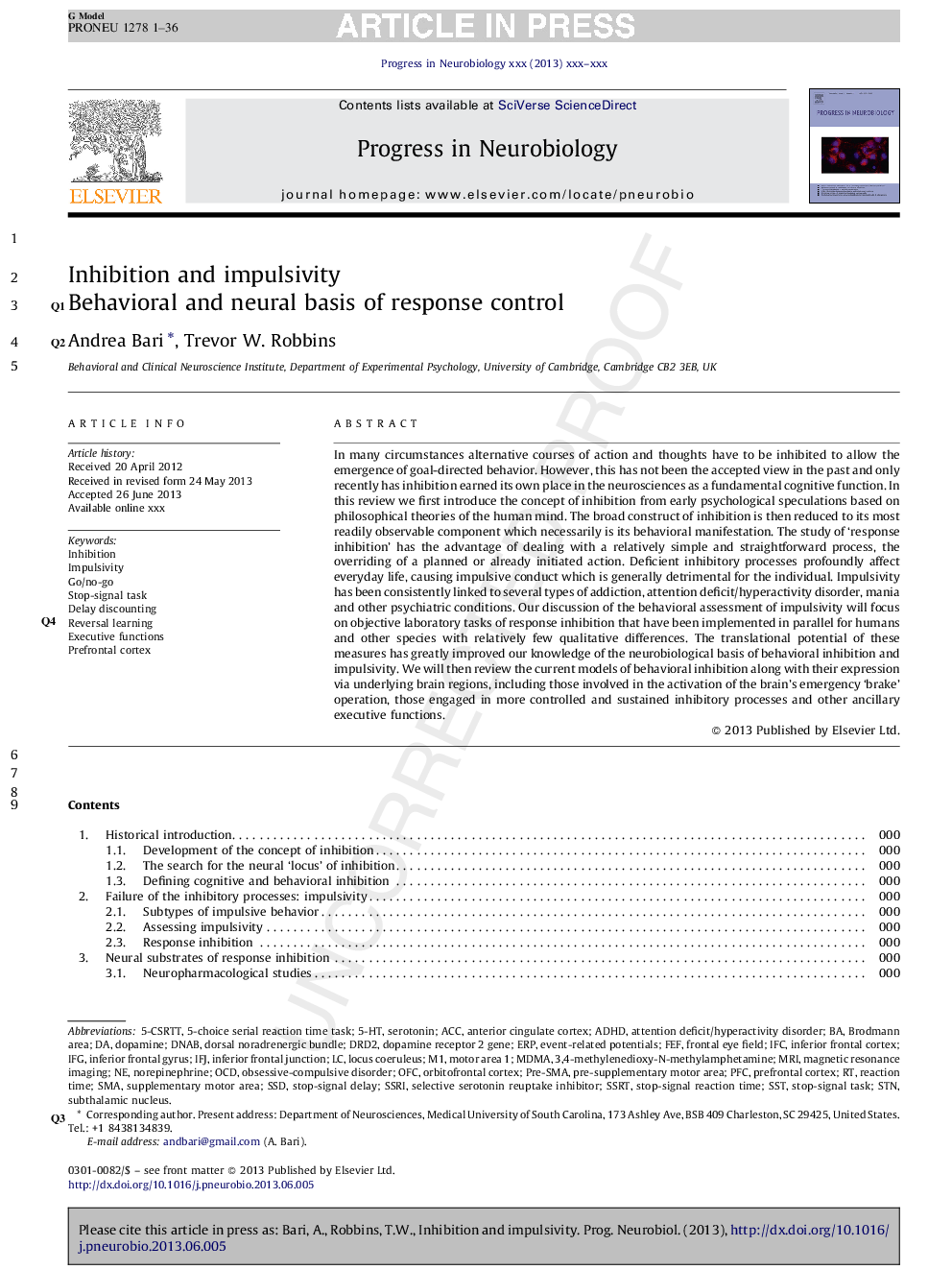| کد مقاله | کد نشریه | سال انتشار | مقاله انگلیسی | نسخه تمام متن |
|---|---|---|---|---|
| 6286548 | 1615401 | 2013 | 36 صفحه PDF | دانلود رایگان |
عنوان انگلیسی مقاله ISI
Inhibition and impulsivity: Behavioral and neural basis of response control
ترجمه فارسی عنوان
مهار و تکانشی: پایه رفتاری و عصبی کنترل پاسخ
دانلود مقاله + سفارش ترجمه
دانلود مقاله ISI انگلیسی
رایگان برای ایرانیان
کلمات کلیدی
ACCIFJDRD25-CSRTTIFGFEF5-HTIFCdnaB - DnaBInferior frontal junction - اتصال کوتاه پایینERP - برنامه ریزی منابع سازمانADHD - بیشفعالیDopamine - دوپامینSerotonin - سروتونینinferior frontal gyrus - قارچ پیشانی پایین ترInferior frontal cortex - قشر زیر جلدیanterior cingulate cortex - قشر سینگولیت قدامی، کورتکس سینگولیت قدامیlocus coeruleus - لوکوس سیرولئوسdorsal noradrenergic bundle - مجموعه نوردرنژیک پشتی پشتیBrodmann area - منطقه بردممنfrontal eye field - میدان چشم پیشانیEvent-related potentials - پتانسیل مربوط به رویداد یا ERP 5-choice serial reaction time task - کار 5 بار واکنش سریال واکنشAttention deficit/hyperactivity disorder - کمبود توجه / اختلال بیش فعالی
ترجمه چکیده
در بسیاری از موارد، روش های جایگزین اقدامات و افکار باید مانع از بروز رفتار مبتنی بر هدف شود. با این حال، این در گذشته پذیرفته نشده است و تنها اخیرا مهار آن جایگاه خود را در علوم اعصاب به عنوان یک عامل شناختی اساسی به دست آورده است. در این بررسی ابتدا مفهوم مهار از پیشگوییهای روانشناسی اولیه بر پایه نظریههای فلسفی ذهن انسان ارائه شده است. ساختار گسترده ای از مهار شدن به این ترتیب به جزء قابل مشاهده ترین آن می رسد که لزوما نشانۀ رفتاری آن است. مطالعه "مهار پاسخ" مزیت برخورد با یک فرآیند نسبتا ساده و مستقیم است که مهمترین اقدام یک برنامه ریزی شده یا در حال حاضر است. فرایندهای مهاری ناچیز عمیقا بر زندگی روزمره تأثیر می گذارند و موجب رفتار پر تحرک می شود که به طور کلی برای فرد مضر است. تکانشگری به طور مداوم با انواع مختلف اعتیاد، اختلال کمبود توجه / بیش فعالی، مانیا و سایر شرایط روانپزشکی ارتباط دارد. بحث ما در مورد ارزیابی رفتاری تکانشی بر تمرکز بر اهداف آزمایشگاهی اهداف مهار پاسخ، که به طور موازی برای انسان و سایر گونه ها با نسبتا کمی از تفاوت های کیفی انجام شده است، تمرکز خواهد کرد. پتانسیل ترجمه این اقدامات تا حد زیادی موجب پیشرفت دانش ما در زمینه عصب شناختی مهار رفتاری و تکانشگری شده است. ما سپس مدل های فعلی مهار رفتاری را همراه با بیان آنها از طریق مناطق مغزی زیرزمینی، از جمله کسانی که در فعال سازی ترمز اورژانسی "مغز" فعالیت می کنند، مورد بررسی قرار می دهیم، کسانی که در فرایندهای مهار کننده کنترل و پایدار و سایر اجزای اجرایی همراه هستند.
موضوعات مرتبط
علوم زیستی و بیوفناوری
علم عصب شناسی
علوم اعصاب (عمومی)
چکیده انگلیسی
In many circumstances alternative courses of action and thoughts have to be inhibited to allow the emergence of goal-directed behavior. However, this has not been the accepted view in the past and only recently has inhibition earned its own place in the neurosciences as a fundamental cognitive function. In this review we first introduce the concept of inhibition from early psychological speculations based on philosophical theories of the human mind. The broad construct of inhibition is then reduced to its most readily observable component which necessarily is its behavioral manifestation. The study of 'response inhibition' has the advantage of dealing with a relatively simple and straightforward process, the overriding of a planned or already initiated action. Deficient inhibitory processes profoundly affect everyday life, causing impulsive conduct which is generally detrimental for the individual. Impulsivity has been consistently linked to several types of addiction, attention deficit/hyperactivity disorder, mania and other psychiatric conditions. Our discussion of the behavioral assessment of impulsivity will focus on objective laboratory tasks of response inhibition that have been implemented in parallel for humans and other species with relatively few qualitative differences. The translational potential of these measures has greatly improved our knowledge of the neurobiological basis of behavioral inhibition and impulsivity. We will then review the current models of behavioral inhibition along with their expression via underlying brain regions, including those involved in the activation of the brain's emergency 'brake' operation, those engaged in more controlled and sustained inhibitory processes and other ancillary executive functions.
ناشر
Database: Elsevier - ScienceDirect (ساینس دایرکت)
Journal: Progress in Neurobiology - Volume 108, September 2013, Pages 44-79
Journal: Progress in Neurobiology - Volume 108, September 2013, Pages 44-79
نویسندگان
Andrea Bari, Trevor W. Robbins,
